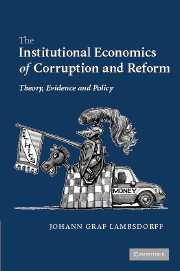Book contents
- Frontmatter
- Contents
- List of boxes
- Acknowledgements
- A roadmap to this book
- 1 Introduction
- 2 Enemies of corruption
- 3 What is bad about bureaucratic corruption? An institutional economic approach
- 4 The dilemma of the kleptocrat: What is bad about political corruption?
- 5 Corruption and transactions costs: The rent-seeking perspective
- 6 Making corrupt deals: contracting in the shadow of the law
- 7 Exporters' ethics and the art of bribery
- 8 How confidence facilitates illegal transactions: An empirical approach
- 9 Corrupt relational contracting
- 10 Concluding thoughts
- Appendix: Technical Details to the Transparency International Corruption Perceptions Index
- References
- Subject index
7 - Exporters' ethics and the art of bribery
Published online by Cambridge University Press: 05 November 2009
- Frontmatter
- Contents
- List of boxes
- Acknowledgements
- A roadmap to this book
- 1 Introduction
- 2 Enemies of corruption
- 3 What is bad about bureaucratic corruption? An institutional economic approach
- 4 The dilemma of the kleptocrat: What is bad about political corruption?
- 5 Corruption and transactions costs: The rent-seeking perspective
- 6 Making corrupt deals: contracting in the shadow of the law
- 7 Exporters' ethics and the art of bribery
- 8 How confidence facilitates illegal transactions: An empirical approach
- 9 Corrupt relational contracting
- 10 Concluding thoughts
- Appendix: Technical Details to the Transparency International Corruption Perceptions Index
- References
- Subject index
Summary
Introduction
The Apostle of Allah (peace be upon him) cursed the one who bribes as well as one who takes bribe.
Sunan Abu-Dawud: Book 24, Number 3573As shown in previous chapters, the willingness to take bribes brings about disadvantages to the corrupt actors themselves. Public servants become useless to those who would like to entrust them with tasks that require integrity. They remain dubious to their corrupt counterparts who would steadily expect to be cheated. Neither task, legal or illegal, may be delegated to them. The willingness to take bribes backfires. I call this the principle of the invisible foot, helping good governance even in the absence of good intentions. But can the power of this principle survive? While the standard invisible hand of competition brings about good markets, does it destroy good governance? Would competition undermine the principle of the invisible foot? I argue that this is not the case. Ethical behavior survives market pressure for various reasons.
In November 1986, Masupha Ephraim Sole was appointed Chief Executive of the Lesotho Highlands Development Authority (LHDA), which was in charge of the Lesotho Water Highlands Project, a system of dams and tunnels that would provide water for South Africa and electricity for Lesotho. A large number of transnational corporations, among them the Canadian company Acres, which provided qualified professional staff to the LHDA, had engaged an intermediary, Mr. Bam.
- Type
- Chapter
- Information
- The Institutional Economics of Corruption and ReformTheory, Evidence and Policy, pp. 164 - 189Publisher: Cambridge University PressPrint publication year: 2007



